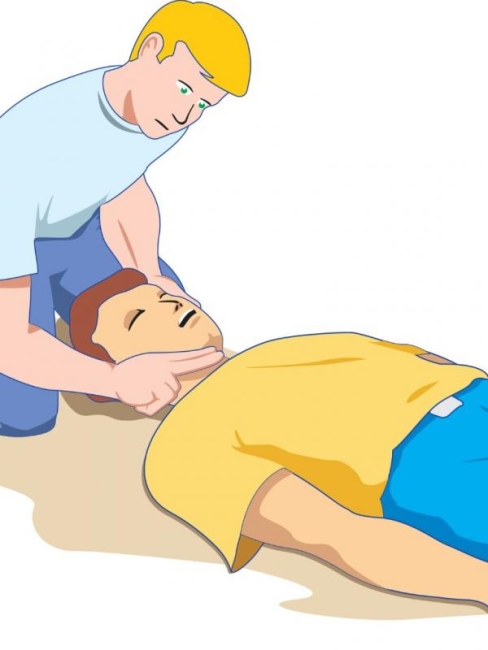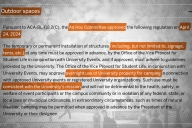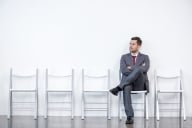You have /5 articles left.
Sign up for a free account or log in.

Istockphoto.com/lcosmo
“Authority is contextual and constructed,” I tell my first-year writing students, all 96 of them, when introducing them to academic research. And what do I mean by that? I’m a composition teacher, I say, so I have some authority on composition. But that doesn’t mean that I have any more authority than they do on other subjects, like engineering or drinking games.
Usually, they roll their eyes. And they should. Teachers wield power and authority over their students in various ways that go beyond academic expertise. That became clear to me during my first year as an instructor, when a student experienced a medical emergency in my classroom at a large research university.
Up until that point, teaching had been intoxicating. The intellectual heft and soapboxing? At 27, I absolutely loved it. But the other kinds of authority -- policing students’ attendance, following the syllabus, checking in with struggling students -- those were admittedly less sexy. It’s a strange facet of matriculating in the humanities that you spend your life challenging authority and then, suddenly, you’re it.
Acting like the guy in charge felt wrong and unearned, so I tried to foster a cool and hip persona, one that treated my role in the classroom as that of a tour guide into the world of rhetoric. The gist of it: I skirted all of the unfun aspects of power while embracing the ones I liked.
But then came the grand mal seizure.
We were halfway through my first summer semester, a six-week stampede of bibliographies and essays, when a student slumped forward and fell facedown under a table. Let’s call him Brandon, a skinny white kid who wore baggy hoodies and carried a patchwork backpack that rarely held the right book. He had the mousy look of the type of kid that easily falls through the cracks -- which he had been. I’d let him do so, failing to follow up about missing assignments and shoddy attendance.
Now he lay on the floor, his body releasing a terrible gasping noise as he seized, his nose and forehead grinding into the carpet. Thinking of his tongue and teeth, I dropped to my knees and eased him on his side. As soon as I did, I questioned it -- never touch a student is a good rule for professors, especially men.
The majority of my students just stared, fixing their gazes down at us. When I looked up from the floor to dismiss them into the hall, I could see a look of expectancy in their eyes, a look that assumed I knew what to do. I didn’t. One student, a volunteer firefighter, called 911 and asked me how the paramedics could best enter the building. I had no idea where the elevator was or which entrance offered the quickest route. It was my academic building; I just came and went each day.
The seizing subsided, and Brandon came to -- pallid and insistent on sitting up. On the bridge of his nose was a bleeding dime-sized sore, and his chin was scuffed raw. I explained to him that his nose was bleeding and gave him a tissue. Nodding, he put the tissue in his mouth and began to chew. I had to wrench it from between his lips.
“No, Brandon, your nose is bleeding.”
“Whose nose? Not my nose?”
“Yes, your nose.”
“Your nose?”
I placed the wadded tissue in his hand and put it to his face.
When the paramedics arrived, they did so with a blocky police officer that stood to the side while they discussed Brandon’s racing heartbeat and enormous pupils. The officer acquired Brandon’s phone to call his emergency contact. It took Brandon several tries to unlock the phone. When prompted, he didn’t even know the day of the week.
During my job training, nine months before, every new university instructor had sat in an enormous lecture hall while two local police officers enthusiastically discussed what to do in the case of an active shooter. “We will not be aiding the wounded,” one officer said, “until we have neutralized the threat.” As they explained to us how to disarm a gunman with textbooks and Macbooks, you could hear the thrill brimming in their voices. But we’d learned nothing about these more likely, but less interesting, scenarios. Like me, they’d seemed more attracted to the idea of their job than the job itself.
Now, I realized, it was one of those same officers that stepped into the hall to call Brandon’s father. He returned a minute later, as the paramedics loaded Brandon onto a gurney.
“You been taking anything we should know about?” the officer asked harshly. Brandon canted his head, trying to make sense of the question.
“Listen,” the officer said. “If you’re real with me -- no bullshit -- I’ll let this slide so you can get the medical attention you need.”
“Let what slide?” I asked. At once I felt protective, even possessive, in a way I’d never felt about a student. Brandon was my student, and I felt like no one could enter my classroom and accuse him of using drugs. It was like my classroom authority was being trampled, which is, of course, somewhat ridiculous. Still, I told Brandon he didn’t have to answer if he didn’t want.
“I see this a lot,” the officer said to me. And when Brandon mumbled something to the effect of “yes,” the officer stared at me and said, “I told you so.” Then they strapped Brandon to the gurney and wheeled him away.
Walking back to my office, I thought of own grand mal seizure. Nineteen years before, in the fourth grade, while we all stood and watched the teacher dangle a plastic prism near the window, I felt myself being to unfurl.
The next thing I would remember would be the warmth of the blood on my chin and the shoes of my classmates shuffling out of the room, some of them laughing and some in tears. The chaos and confusion of it was something I’ll never forget. It still flushes me with embarrassment.
My mother worked at a magnet factory just down the road, so she arrived at the school at the same time as the paramedics. As they carted me out with a towel on my chin to stanch the bleeding, the teacher gave me a thumbs-up and said, “Jake. No homework!” Later that evening, after some stitches and a flurry of tests at the hospital, that teacher would call my home to check on me. We never got a definitive answer about the cause, and it never happened again.
Now, with Brandon, all I had was a lousy email address. So I sent him an email, and one to his academic adviser, who didn’t respond. “You’re not in high school anymore,” I had liked to tell my students as a biting way to remind them that I wasn’t going to monitor them closely. But, for the first time, I wished that I had been checking in more. Furthermore, I wished I had more reach into their lives. It was a feeling that made me uncomfortable and conflicted, as my two opposing philosophies of education suddenly smacked hands.
Back at my building, I went to my supervisor, who told me that the next thing to do was to write a detailed report of exactly what happened, including my interaction with the police and EMTs. While it was clearly standard practice, I couldn’t help but hear a tamped concern in her voice. I couldn’t help but think that I could be held accountable. For what? I didn’t know, exactly. But I had a sense that no matter what I’d done, I’d have done something wrong.
Authority Begets Authority
Before I started teaching, I was a social worker, and before that, I spent a few years doing manual labor. So I’ve seen my share of injured and sick people. I’ve seen construction workers faint and crack their heads in the heat, and women with noses broken by men they thought loved them. But Brandon’s seizure left me more shaken than those. Why? Because, in the moment, my students wanted me to be more than the fun and casual professor they’d come to know. In the moment, my pop-culture references and inspirational pep talks about the value of language were suddenly irrelevant and bullshitty.
My authority was constructed and contextual, as I’d told them. But what I hadn’t realized was that my students were active in its construction by looking to me to take charge in an emergency. It was an aspect of teaching I’d never considered: caring for my students meant more than just caring about their development of rhetorical awareness. Caring for them meant occasionally doing much more.
Authority begets authority, meaning that many students see their professors as more than just their teachers. They see them as advisers, mentors, life coaches, even friends. Often, professors are the first adults that students come to know outside of the aura of their parents. While “paternalism” has become a dirty word in academe lately, college students do want their teachers to care about them. Read the comments of some student evaluations, and one word consistently associated with great classroom experiences is “caring.” The current trend in academe is to combat the idea that professors operate in loco parentis by treating their students as adults. But adulthood is a false dichotomy and is better understood as a spectrum. Most of my students see me as more adult than themselves. Consequently, intrinsic to my classroom authority was students’ expectation that I’d take care of situations therein. Whether or not professors want that expectation, it exists.
Brandon never returned to my course or responded to the two follow-up emails I sent him, first about his health and then about his enrollment. I never received any updates or inquiries from administration about the incident. Brandon was the just gone, like too many of my students.
In the three years that have followed the seizure, as the age gap between my students and me widens, I’ve changed as a teacher and authority figure. I catch myself doing things I never would have done: telling a student he looks tired and should try to get more sleep, slipping a student a note saying leave whenever you need to after I learned she’d been grieving a death, even writing the upcoming weather forecast on the board during a bitter cold snap. Maybe you can call it paternalistic, but that’s OK. As long as the mind is part of the body, I can’t separate my care for my students’ intellectual development with my care for their general well-being.
This isn’t to say that I’ve become a great professor -- I’m still disorganized, moody and haphazard -- but at least I have become a more human professor. It’s a strange contradiction that taking more authority over my classrooms has allowed me to build stronger relationships with my students.
I know that reaching out to Brandon wouldn’t have prevented his seizure. Of course not. But I do regret the naivety with which I approached teaching at first. I remember, during my first year, telling my students that I wanted them to feel free to bring their outside lives into the classroom. What I didn’t know was that their lives don’t need an invitation.








